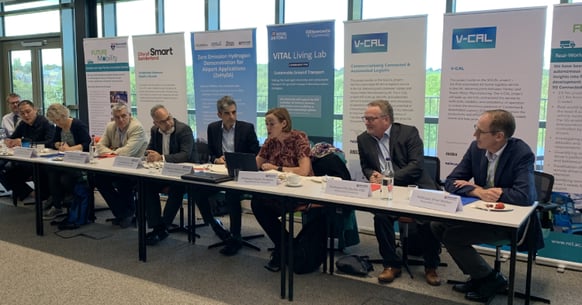The visit to Newcastle was to hear about the new Research Hub for Decarbonised Adaptable and Resilient Transport Infrastructures (DARe).
Led by Newcastle University, the DARe hub will help to upgrade and decarbonise the UK’s complex and interconnected national, regional and local transport infrastructures and to adapt to the effects of climate change.
A roundtable discussion and presentation brought together senior members of the ExCo, the DARe project team and industry partners, to present an overview of the hub, its priorities and the research and solutions it will deliver.
The ExCo steers the DfT’s strategic vision, whilst providing scrutiny for DfT policies and making significant management decisions across DfT. Strategic Priority boards that report to ExCo oversee DfT’s priorities to grow and level up the economy, reduce environmental impacts, improve transport for the user and increase our global impact.

National expertise
The new national hub will provide expertise, innovative modelling and engagement to support net zero transport networks that work for people and communities. Home to world-leading researchers, it will provide expertise, modelling and data tailored to each area and each transport challenge.
Professor Phil Blythe CBE, Professor of Intelligent Transport Systems, and Head of the Future Mobility Group: "It was great to welcome the ExCo to Newcastle University, not only to discuss the challenges ahead but more importantly the solutions DARe will provide. Meeting our team first-hand and seeing our facilities will help ensure that we are the go-to for policymakers and provide that national focus for research into how we decarbonise and make resilient our Transport Infrastructure.”
-1-1.jpg?length=582&name=Stephenson_Building_Dusk_View%20(featured%20image)-1-1.jpg)
A hub of transport innovation
Whilst at the University, the ExCo also visited Newcastle Helix to learn about the Urban Observatory. The Urban Observatory is home to the largest set of publicly available real-time urban data in the UK which can help experts to improve air quality, manage transport growth and traffic congestion, and prepare for climate change.
They also visited the Urban Traffic Management Centre, a real-time facility managed in collaboration with the North East councils, which monitors the city's traffic and infrastructure and supports transport research and learning. The delegation also discovered how we use data collected from EV rapid charging points and our plans to develop an Electrification Process Innovation Centre (EPIC).
DARe will work to be the go-to for policymakers and provide national focus for how we decarbonise
Professor Phil Blythe CBE Professor of Intelligent Transport Systems

.jpg?length=1920&name=For%20policymakers%20(News%201800x1213).jpg)